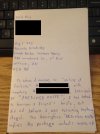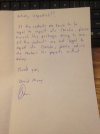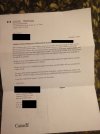- Joined
- Jul 23, 2015
- Messages
- 12,410
CBSA just grabbed a package on its way to me. The description on the "Notice of Seizure" was "PRESUMED KNIFE". Has anyone seen this before? It makes it sound like they didn't even inspect the contents, but used ESP to decide there is a knife inside.
pre•sume prĭ-zoo͞m′
It does communicate their bureaucratic audacity, though, that's for sure.
pre•sume prĭ-zoo͞m′
►
- intransitive verb
To take for granted as being true in the absence of proof to the contrary. - intransitive verb
To constitute reasonable evidence for assuming; appear to prove. - intransitive verb
To venture without authority or permission; dare.
It does communicate their bureaucratic audacity, though, that's for sure.



